|
Author: Katie Grzesiak, ISN Coordinator At ISN we get a lot of questions about “homemade” alternatives to traditional herbicides, including Epsom salts, table salt, vinegar, and hammering copper nails into trees. This article is a more in-depth exploration of these methods, including references. First, it’s important to define an herbicide as an agent applied to a plant to kill, defoliate, or otherwise impede its growth. An herbicide can be a glyphosate product or other “traditional” herbicide, or an organic herbicide like copper sulfate; home remedies also become herbicides when they’re applied to plants! It’s also important to note that anything being used as an herbicide has a potential to be hazardous to humans in some way, whether it’s a short-term hazard (like a physical or chemical burn on the skin) or more long-term. Caution is important, including wearing appropriate personal protective equipment (PPE) and storing safely. However, using agents that are not tested and labeled as herbicides means you don’t know what precautions are necessary for yourself or the environment. Questions about pesticide testing and registration should be directed to the Michigan Department of Agriculture and Rural Development. Second, herbicides are just one tool in the invasive species management toolbox (also called Integrated Pest Management). Many invasive species can be controlled by physical, cultural, and/or mechanical means, and others have biological enemies to help keep them in check. If you’d like assistance in choosing the method that’s right for you, please contact us! We’d be happy to help you choose between the available options, which vary by species, site, budget, and time available. 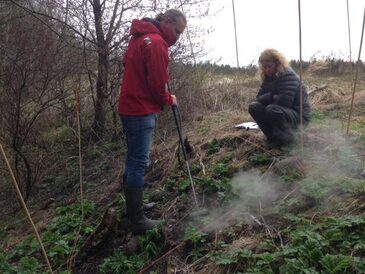 Photo courtesy of Heatweed Technologies Photo courtesy of Heatweed Technologies Epsom salts (MgSO4) have historically been used as fertilizer; in theory, you could apply them at such high concentrations that they kill plants, but it would take a lot, and could damage soils long-term. ISN does not recommend using Epsom salts as an herbicide. Copper nails driven into an undesirable tree’s trunk are an often-told home remedy. However, while copper can absolutely be toxic (it’s a main ingredient in several herbicides, particularly those used in organic settings), you’d need to use a LOT of nails to get enough copper into the tree’s system to cause harm, at which point you’d be close to girdling the tree (which would kill many non-suckering trees anyway). Additionally, copper nails are expensive! If you’re thinking about copper nails and want to avoid herbicides, you may want to consider girdling or just cutting down the tree or shrub instead. ISN does not recommend using copper nails as an herbicide. Table salt (NaCl) will definitely kill plants—salt is very toxic! However, it will also kill the next thing you plant in that spot… and possibly the one after that, and after that. It can permanently damage the soil; there’s an old tradition about “salting the earth” (not to be confused with “salt of the earth”) after defeating an enemy, and it’s quite a potent curse! If you were considering using table salt on a cut stem or stump, you may want to consider traditional herbicide or horticultural vinegar instead, as there are options that don’t remain active in soil for very long. ISN does not recommend using table salt—or any other salt, like rock salt—as an herbicide. Boiling water has been used very successfully to kill plants in a variety of settings, as the heat ruptures cells and kills the tissues. Just pouring it out of the kettle onto the offending weed can work well, provided the weed is small enough to be affected (a great way to take care of weeds in sidewalk cracks, for example). However, for hardier weeds with deep roots or even just larger plants, this may not be enough. Several companies have created ways to inject heated water into roots, spray it out over an area, or otherwise target undesirable species. (See photo for an example of Heatweed Technologies using this method). This can be very effective, though, safety for the applicator as well as any nearby plants must be considered. Of course, as soon as the water cools down a bit, it’s just regular water and harmless (but also ineffective for plant control). ISN recommends using boiling water in situations where contact-kill is acceptable, or where proper machinery is used to deliver the desired result. Vinegar (acetic acid) will also kill plants; it does a great job of destroying the proteins that make up cells. It can also lower the pH of soil (make it more acidic), which can be inhospitable to growing things, though vinegar will break down in soil over time. It acts as a “contact herbicide,” meaning it kills or damages any part of the plant it comes into contact with (or the plant next to it!), but is not transported to other parts of the plant; if the plant is big enough it could be damaged in one area, but perfectly healthy in another. Kitchen vinegars, like white and cider, are just 5% acetic acid (that’s not strong enough completely kill more than a seedling dandelion), and are not labeled for use as herbicides; ISN does not recommend using kitchen vinegars as herbicides. There are horticultural vinegars that are much more potent—usually about 20% acetic acid—that are labeled to be sold as herbicides and can be very effective. At that concentration, however, horticultural vinegar can also harm humans and other animals, and care should be taken (including reading and following the label—it’s the law!) to use it property. It’s also important to note that horticultural vinegar is actually more acutely toxic to animals than some traditional herbicides, which often comes as a surprise! Good uses for horticultural vinegar include preventing stump-sprouting on a recently cut tree (though not those that root sucker), or foliar-spraying a weed or small shrub that does not have a deep root structure. ISN does not recommend using horticultural vinegar outside of its labeled use, or in situations where a systemic herbicide is required for successful control. ISN recommends using horticultural vinegar according to its label in situations where a contact herbicide is desired. Soaps, including dish soap and Castile soap, are not an herbicide, but are often recommended for use as an at-home surfactant (an herbicide additive that helps the active ingredient stick to a slippery plant surface). However, soap comes with risk—it harms fish and frogs when it gets into waterways by making it difficult for them to breathe, even destroying their skin/gills. Even very small amounts of soap can harm them! Approved, fish-safe surfactants are not expensive and can be purchased from a local herbicide purveyor for use in plant control projects. ISN does not recommend using soap for activities beyond washing (or fun bubble-making), and only far from natural water sources. Combinations of various ingredients (Epsom salt + vinegar + soap is especially popular online) are generally not recommended, as there is no evidence that the combination works better than just the most effective ingredient alone. We know this is a lot of information, and a lot of variables. If you’d like assistance in choosing the method that’s right for you, please contact us! We’d be happy to help you choose between the available options, which vary by species, site, budget, landowner preferences, and time available. References and further reading:
33 Comments
Sarah Pregitzer
4/21/2021 07:34:41
Good article Katie. Thanks.
Reply
Donald Thomas
8/7/2021 20:17:30
Where do you get this Glyphosate and will this destroy all the weeds when mixed with vinegar and what percentage of each?
Reply
Emily Cook
8/9/2021 15:46:49
Hi Donald - Glyphosate alone is a strong herbicide and does not need to be mixed with anything for it to be effective. It is a common ingredient in many "off the shelf" herbicides - in Round-Up, for example. It can be purchased at most hardware/landscaping businesses.
Reply
Janice Scott
8/25/2021 11:34:46
A section of our lawn is being taken over by Japanese stiltgrass. Last year, we tried digging some up, but this year there is too much. We don't mind temporary brown spots and are not near storm drains. I heard that essential oils can be used as surfactants, such as citronella, and have some on hand. We plan to use 30% vinegar. We hope to catch the weeds before they flower. Would it be better to use a small amount of soap and omit the citronella? Do we need to dilute the vinegar?
Reply
8/26/2021 13:17:51
Hi Janice,
Reply
Sherry
9/5/2021 22:32:19
We have just installed rip rap along our shore line and weeds are growing through the erosion blanket. Is there something safe to use to kill the weeds?
Reply
Patricia A Zielinski
6/6/2023 11:57:44
I live on a small lake in an HOA community. What can I personally use to kill weeds that are growing through the rock rip rap without harming animals the lake water and other plants.
Reply
Janet
7/23/2023 16:03:28
Your hands are safe to use to kill the weeds. The weeds growing on a shoreline should be easy to pull because what they're growing in should be loose and wet. Spraying anything on the weeds (besides hot water) is going to negatively affect all species of water fauna.
Reply
1/12/2022 07:14:48
I never knew that it’s important to define an herbicide as anything applied to a plant to kill, defoliate, or otherwise impede its growth. I never thought that it would be like this, it is a good article to read, I'll share this with my aunt. Thank you for the information about weed control.
Reply
8/12/2022 03:11:02
Thank you for sharing this informative article. I hope a lot of people who are inspired by gardening could read this wonderful article.
Reply
8/22/2022 15:38:37
It was interesting when you mentioned that herbicides are just one tool that can be used to control weeds. I would imagine that the types of weeds you have in your area can affect what kind of control method you should use. Talking with a professional weed control company would probably be a good way to learn more about the plants in your area.
Reply
Audrey Menninga
8/23/2022 07:56:23
Hi Henry,
Reply
Kathryn Hauser
9/14/2022 07:55:35
I have a 7,700 square feet of my yard that I put in bark chips and need to kill the weeds each year. What would you recommend to use?
Reply
Audrey Menninga
11/17/2022 10:54:42
Hi Kathryn,
Reply
11/28/2022 04:58:04
It's great that you discussed that boiling water can successfully kills the small weed. My friend told me that their weeds have grown enough to not be affected by boiling water. I think it's best to turn to a weed control service to kill them successfully.
Reply
Audrey Menninga
11/28/2022 10:25:52
Hi Victoria,
Reply
1/3/2023 06:39:59
You article is one of the most exclusive one. Keep going.
Reply
1/3/2023 06:41:31
I think you readers will like my article too. Hope it will be a good exchange of knowledge.
Reply
3/10/2023 04:39:31
I like the fact that you talked about the management practices I can do to maintain front lawns. My sister's boss had problems with weed buildup in his front lawn. My sister asked me about ways to counteract this buildup of weeds to maintain the pristine look of his front lawn. Thank you for this instructional article, I will surely forward the message so that he consults a professional landscape contractor about this weed problem.
Reply
4/2/2023 09:49:11
I appreciate you sharing this helpful article. I trust a many individuals who are motivated by cultivating could peruse this great article.
Reply
6/1/2023 04:45:38
I found this resource on homemade weed control methods to be quite informative. It offers practical advice on what works effectively and safely, as well as what should be avoided. I appreciate the emphasis on using natural alternatives like vinegar and boiling water, which can be effective for controlling weeds without resorting to harmful chemicals. The article's caution about certain homemade concoctions and their potential negative impact on plants and the environment is also valuable, encouraging readers to make informed choices when it comes to weed control.
Reply
11/9/2023 10:34:34
Thank you for posting this useful article. I hope that numerous people who are passionate about gardening will have the opportunity to read this excellent piece.
Reply
12/13/2023 21:04:06
Reply
12/22/2023 01:01:21
I'm grateful for your sharing of this valuable article. It would be wonderful if many gardening enthusiasts could have access to this outstanding piece of writing.
Reply
12/29/2023 10:24:05
Thank you for sharing this insightful article. It would be fantastic if numerous gardening enthusiasts could read this excellent piece.
Reply
5/8/2024 22:52:34
This article on homemade weed control provides invaluable insights into alternative methods for managing unwanted plants without resorting to traditional herbicides. Katie Grzesiak's comprehensive exploration of various homemade remedies, such as Epsom salts, vinegar, and boiling water, offers a clear understanding of their effectiveness and potential risks. By emphasizing caution and highlighting the importance of environmental safety, Grzesiak empowers readers to make informed decisions about weed control while minimizing harm to themselves and the ecosystem. Her practical advice, coupled with a focus on integrated pest management, underscores the importance of considering multiple factors when choosing a weed control method. Overall, this article serves as a valuable resource for anyone seeking eco-friendly alternatives to chemical herbicides. Great job, Katie, for providing such valuable guidance on a crucial topic!
Reply
5/9/2024 04:57:51
Kudos to Katie Grzesiak for shedding light on homemade weed control methods with such clarity and detail! This article not only delves into various alternatives to traditional herbicides but also emphasizes the importance of safety and environmental considerations. I appreciate the straightforward explanations of each method's effectiveness and potential risks, along with practical recommendations for choosing the right approach based on specific needs and circumstances. Grzesiak's insights have truly empowered me to make informed decisions about weed management while prioritizing safety and environmental stewardship. Great job!
Reply
5/18/2024 08:00:15
This article is incredibly helpful in breaking down the pros and cons of various homemade weed control methods. It's easy to feel overwhelmed by all the options out there, but this piece provides clear explanations and practical advice. I appreciate how it emphasizes the importance of safety and caution when using any herbicide, whether it's homemade or commercial. The article's straightforward language and detailed explanations make it easy to understand, even for someone like me who's not an expert in gardening or chemistry. Overall, it's a valuable resource for anyone looking to manage weeds in their garden without resorting to harmful chemicals. Great job!
Reply
5/19/2024 07:52:49
Katie Grzesiak's article on homemade weed control provides valuable insights into alternative methods for managing unwanted plants without resorting to traditional herbicides. By exploring various household items like Epsom salts, vinegar, and even boiling water, Grzesiak highlights the importance of understanding the potential risks and benefits associated with these homemade solutions. Her emphasis on safety and caution reminds us of the importance of responsible stewardship when it comes to managing our environment. Moreover, Grzesiak's article encourages readers to consider factors like species, site conditions, and budget constraints when choosing the most appropriate weed control method. Overall, this article serves as a comprehensive guide for anyone seeking eco-friendly alternatives to conventional herbicides, and it has certainly expanded my understanding of the topic. Great job, Katie!
Reply
5/26/2024 06:18:59
Katie Grzesiak's article on homemade weed control is a lifesaver for anyone looking to tackle pesky plants without resorting to harsh chemicals. With clear explanations and practical advice, she demystifies common DIY methods like using Epsom salts, table salt, vinegar, and copper nails, highlighting their effectiveness and potential risks. By emphasizing safety and environmental considerations, Katie empowers readers to make informed choices about weed management while protecting themselves and their surroundings. Her thorough research and thoughtful recommendations make this article a valuable resource for anyone striving for a greener, healthier garden. Great job, Katie!
Reply
5/26/2024 08:16:24
This article on homemade weed control is incredibly informative and thorough, providing valuable insights into various methods of managing weeds without relying on traditional herbicides. I appreciate how the author not only explains the potential effectiveness of each method but also highlights the safety concerns associated with them, emphasizing the importance of caution and responsible usage. The inclusion of real-life examples and practical recommendations makes the topic more relatable and accessible to readers. Overall, this article has expanded my understanding of weed control options and empowered me to make more informed choices about managing invasive plants on my own property. Great job!
Reply
6/18/2024 09:41:44
This article was really helpful in understanding which homemade weed control methods work and which ones don't. I learned that using things like Epsom salts, table salt, and copper nails isn't a good idea because they can harm the soil and environment. Boiling water and vinegar can work, but you have to be careful. Thanks for explaining it so clearly!
Reply
Leave a Reply. |
ArchivesCategories |
| habitatmatters.org |
Contact US231-252-4148
3334 Veterans Drive Unit A Traverse City, Michigan 49685 |
Pleasant Peninsula Design, Habitat Matters 2017
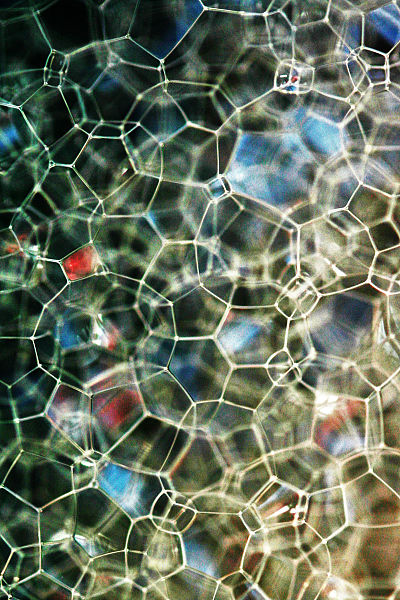
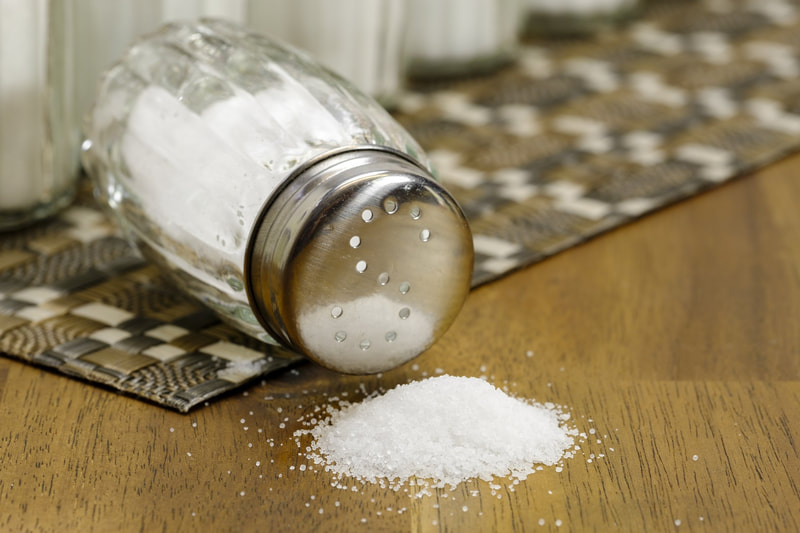
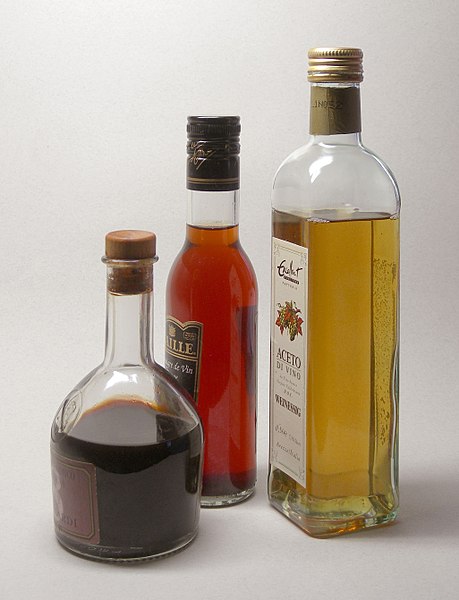
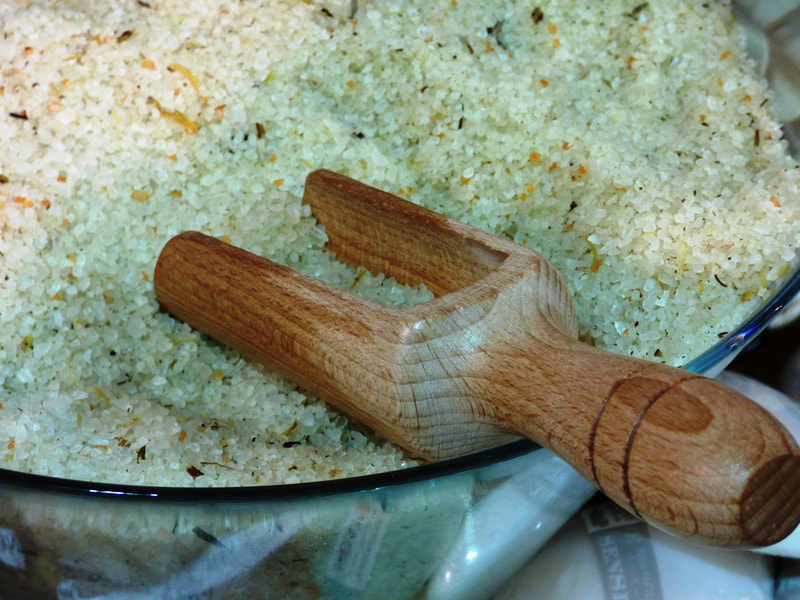
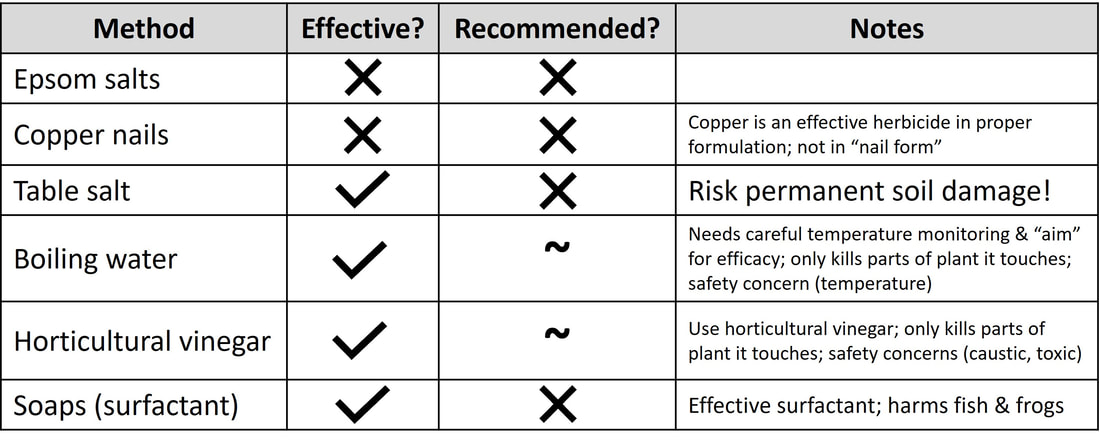
 RSS Feed
RSS Feed
